Please don’t give (or take) stupid advice from analyses like this.
Since yesterday, Nick Wolfinger and Brad Wilcox have gotten their marriage age analysis into the Washington Post Wonkblog (“The best age to get married if you don’t want to get divorced”) and Slate (“The Goldilocks Theory of Marriage”). The marriage-promotion point of this is: don’t delay marriage. The credulous blogosphere can’t resist the clickbait, but the basis for this is very weak.
Yesterday I complained about Wolfinger pumping up the figure he first posted (left) into the one on the right:
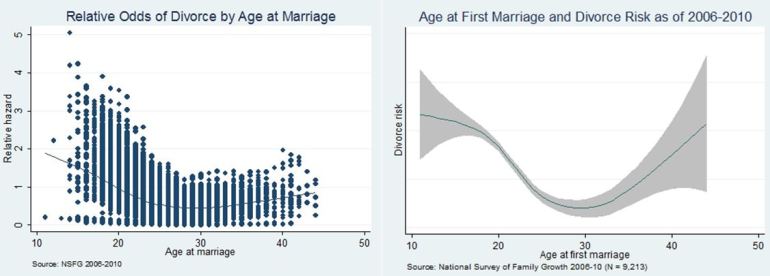 Today I spent a few minutes analyzing the American Community Survey (ACS) to check this out. Wolfinger has not shared his code, data, models, or tables, so it’s hard to know what he really did. However, he lists a number of variables he says he controlled for using the National Survey of Family Growth: “sex, race, family structure of origin, age at the time of the survey, education, religious tradition, religious attendance, and sexual history, as well as the size of the metropolitan area.”
Today I spent a few minutes analyzing the American Community Survey (ACS) to check this out. Wolfinger has not shared his code, data, models, or tables, so it’s hard to know what he really did. However, he lists a number of variables he says he controlled for using the National Survey of Family Growth: “sex, race, family structure of origin, age at the time of the survey, education, religious tradition, religious attendance, and sexual history, as well as the size of the metropolitan area.”
The ACS seems better for this. It’s very big, so I can analyze just the one-year incidence of divorce (did you get divorced in the last year?), according to the age at which people married. I don’t have family structure of origin, religion, or sexual history, but he says those don’t influence the age-at-marriage effect much. He did not control for duration of marriage, which is messed up in his data anyway because of the age limits in the NSFG.
So, in my model I used women in their first marriages only, and controlled for marriage duration, education, race, Hispanic ethnicity, and nativity/citizenship. This is similar to models I used in this (shock) peer-reviewed paper. Here are the predicted probabilities of divorce, in one year, holding those control variables constant.
Yes, there is a little bump up for the late 30s compared with the early 30s, but it’s very small.
Closer analysis (added to the post 7/19), generated from a model with age-at-marriage–x–marital duration interactions, shows that the late-30s bump is concentrated in the first five years of marriage:
This doesn’t much undermine the “conventional wisdom” that early marriage increases the risk of divorce. Of course, this should not be the basis for advice to people who are, say, dating a person they’re thinking of marrying and hoping to minimize chance of divorce.
If you want to give advice to, say, a 15-year-old woman, however, the bottom line is still: Get a bachelor’s degree. You’ll likely earn more, marry later, and have fewer kids. If you or your spouse decide to get divorced after all that, it won’t hurt that you’re more independent. For what it’s worth, here are the education effects from this same model:
(The codebook for my IPUMS data extraction is here, my Stata code is here.)
Anyway, it’s disappointing to see this in the Wonkblog piece:
But the important thing, for Wolfinger, is that “we do know beyond a shadow of a doubt that people who marry in their thirties are now at greater risk of divorce than are people who wed in their late twenties. This is a new development.”
That’s just not true. I wouldn’t swear by this quick model I did today. But I would swear that it’s too early to change the “conventional wisdom” based only on a blog post on a Brad-Wilcox-branded site.
Aside
One interesting issue is the problem of age at marriage and education. They are clearly endogenous — that is, they influence each other. Women delay marriage to get more education, they stop their education when they have kids, they go back to school when they get divorced — or think they might get divorced. And so on. And, for the regression models, there are no highly-educated people getting married at really young ages, because they haven’t finished school yet. On the other hand, though, there are lots of less-educated people getting married for the first time at older ages. Using the same ACS data, here are two looks at the women who just married for the first time, by age and education.
First, the total number per year:
Then, the percent distribution of that same data:
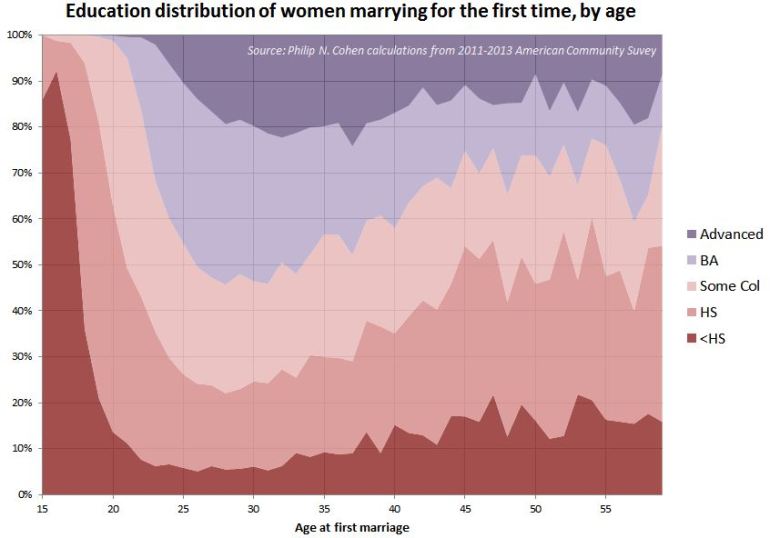 Interesting thing here is that college graduates are only the majority of women getting married for the first time in the age range 27-33. Before and after that most women have less than a BA when they marry for the first time. This is also complicated because the things that select people into early marriage are sometimes but not always different from those that select people into higher education. Whew.
Interesting thing here is that college graduates are only the majority of women getting married for the first time in the age range 27-33. Before and after that most women have less than a BA when they marry for the first time. This is also complicated because the things that select people into early marriage are sometimes but not always different from those that select people into higher education. Whew.
It really may not be reasonable to try to isolate the age-at-marriage effect after all.
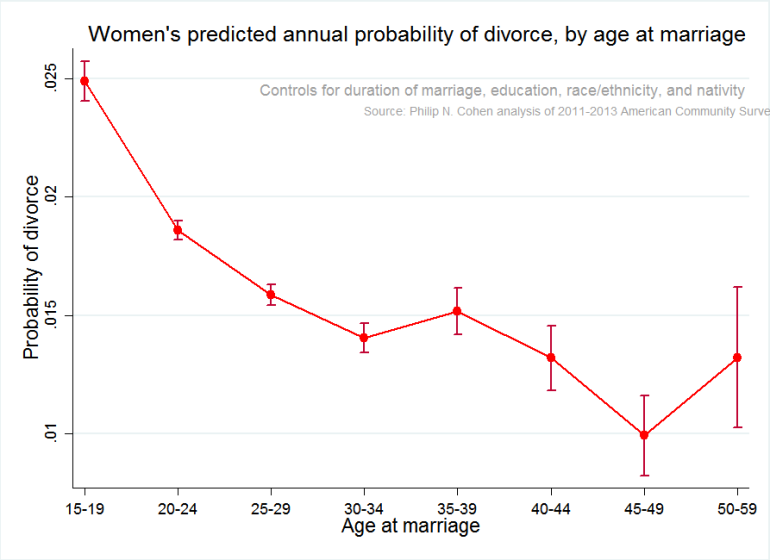
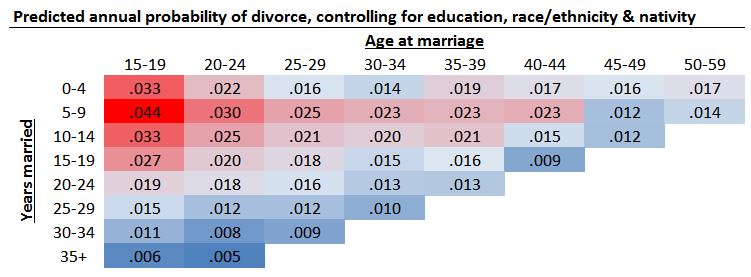
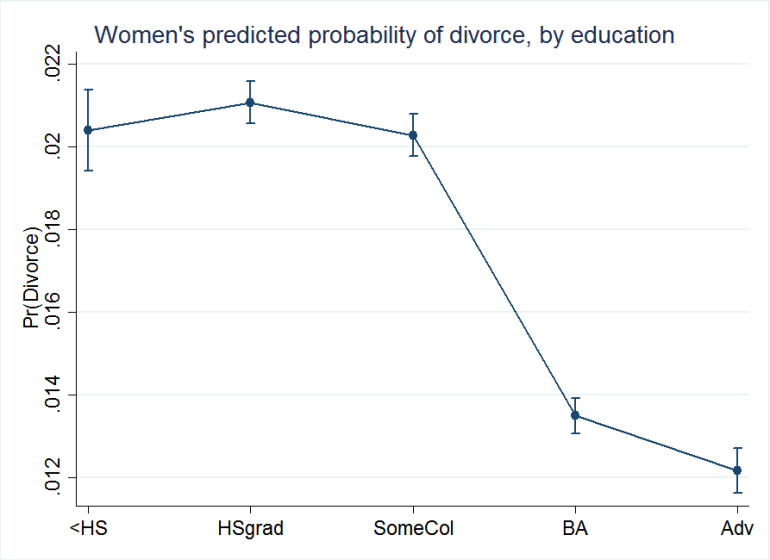
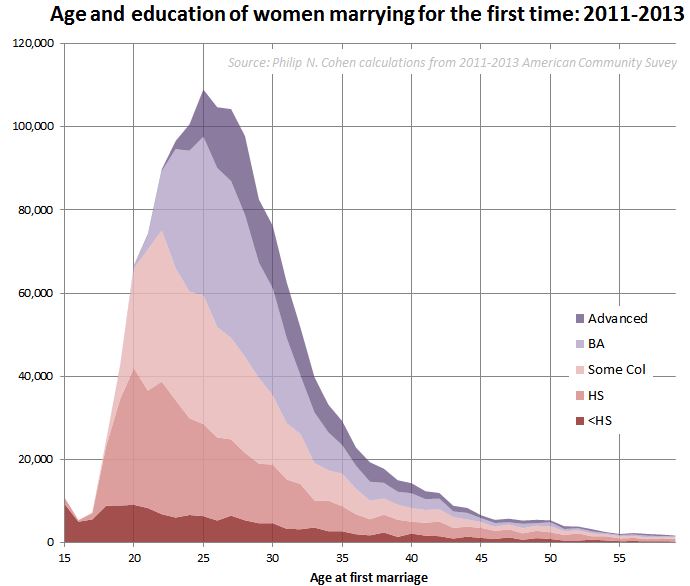

I know I’ve stumbled across references to a study that says “living together before marriage increases the risk of divorce” came from neglecting to look at age, and once you treat “age at cohabitation” and “age at marriage” as the same variable the differences go away. That seems like it would not only screw up any analysis, but completely defeat the purpose of trying to find out age & risk of divorce correlations (for non-sociologists), as people who are worried that they’re “too young” to get married will often live with their SO instead (anecdotally, based on advice I see floating around and what peers have done. That said, my peers are a really bad group to use for comparison – not only are they mostly university educated, but a large number of them were either married or living with their SO either during undergrad or within a month or so afterwards.)
LikeLike
To tie things together, it would be interesting to see women’s annual probability of divorce by age at first marriage for each education group. Does early marriage have the same effects on the risk of divorce for those who have less education as it does for for this with more education? While delaying marriage (as if marital decisions take place in a vacuum) may make sense for those with or pursuing advanced education, does it make as much sense for those without or not or pursuing advanced education? In other words, is the “conventional wisdom” universal?
LikeLike
Problem is there’s no one who marries early with high education (and no way to know who’s on the way to higher ed), so you can’t make the comparison.
LikeLike
Isn’t marriage under the age of 23 generally considered to be early though? So there’s that reasonably substantial group to use. Not knowing how the statistics are counted, do people only count as “high education” for the purposes of the divorce rate statistics if they have their degrees before they get married, or does someone who gets married in undergrad (I know, less common now than 30 years ago) count as having finished a bachelors after they graduate?
LikeLike
But how do you know if then they graduate or then maybe they drop out of school because (key point) they get married? You need at least longitudinal data to try to clarify this, and i still can think of about a hundred other things that could potentially screw up the analysis- but really, it’s likely that the isolated effect of age is null. What’s the point anyway? I agree with Phil.
LikeLike
Well that’s pretty much what I was asking about. I didn’t know when the data is collected. Is it collected when people get married? Is it collected when they divorce? Is it a survey done periodically? (And if your question is “do we know if marriage was a contributing factor in them graduating or not?”, that’s part of why I was asking.)
LikeLike
The analysis is from one point in time. They asked (not exact wording): What year did you get married, did you get divorced in the last year, what is your current education. So we don’t know the timing of their marriage relative to their time in school. For example, the “some college” people who just got divorced might be going back to school right now (cause or consequence of marriage trouble), the married college graduates could have met their spouse in college, or married right out of high school. Etc. Add to that, of course, who is their spouse? We know nothing of that person because they are not living in the household, and it’s a household survey. (I’m working on a post about this as a follow-up…)
LikeLike
You control for gender and predict women’s outcomes but doesn’t Nick’s model include both men and women?
LikeLike
I used only women. He controlled for gender.
LikeLike
Why does the analysis begin at age 10?
LikeLike
I start mine at age 15. (Census doesn’t ask marital status below age 15, but in the retrospective question (what year did you get married) they let people offer years that work out to ages below that.) Nick included several people who said they were married at 12, which are probably data errors.
LikeLike
OK, for the sake of argument, let’s say that divorce rates among late-marrying couples are not so low as they used to be.
Maybe in the past there were fewer people marrying late and more people married generally so the late marrying couples felt more trapped in unhappy relationships. Now, marrying late is more common, there are lots of single folks around, so unhappy late marrying couples can break free more easily.
LikeLike
That’s very reasonable, except that mechansim might just as well lead to more divorce for everyone, I think. If the late marriages always had a “negative” selection — people feeling forced to marry choosing unwisely, or people with poor relationship skills or assetts — then maybe a rising acceptance of divorce (and remarriage) would allow that post-30 bump to emerge. Hard to know without a good time series.
It is easier to think about the possibilities if you don’t insist on divorce as a bad outcome. The little bump is happening off a pretty low base — it could reflect something good.
LikeLike
Is the base/implied question to do with divorce per se, or with divorce after you’ve had kids? Is the “harm” of divorce understood to link to harm to kids more than to the adults involved? Getting divorced (without kids) is part of some “highly educated” people’s learning process (and may lead them to get a BA if they didn’t have one before) – the Starter Marriage concept. How does age at first birth play in?
LikeLike
All important questions we can’t address with this Census data!
LikeLike
Reblogged this on Project ENGAGE.
LikeLike